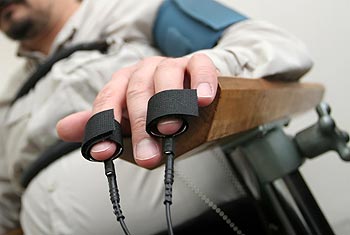
Lie detector/polygraph
 Increasingly frequently commercial organizations use polygraph for check of their employees. It is also called " a lie detector". What it is, how it works and how legal and ethical is its use? The companies usually use "a lie detector" in three cases. Firstly, when hiring a new employee to work. In this case, the purpose of testing is to find out whether the candidate has any criminal records, mental disorders, uses any drugs, etc. Secondly, the polygraph is used if the theft has occurred at the company to quickly find the guilty person. And, thirdly, organizations carry out checks of their employees "for prevention" and during dismissal. As a rule, not all company's staff is tested, but only employees of financial and commercial services and top managers.
Increasingly frequently commercial organizations use polygraph for check of their employees. It is also called " a lie detector". What it is, how it works and how legal and ethical is its use? The companies usually use "a lie detector" in three cases. Firstly, when hiring a new employee to work. In this case, the purpose of testing is to find out whether the candidate has any criminal records, mental disorders, uses any drugs, etc. Secondly, the polygraph is used if the theft has occurred at the company to quickly find the guilty person. And, thirdly, organizations carry out checks of their employees "for prevention" and during dismissal. As a rule, not all company's staff is tested, but only employees of financial and commercial services and top managers.
Polygraph a device that detects a person's response to the questions asked to him/her. A specially trained professional - polygraph specialist - interprets its readings.
"Lie detector" registers physiological parameters: conductivity of skin, breast and diaphragmatic breathing, blood pressure and heart rate, motor and speech activity, etc. When a person is asked a question that he/she does not want to answer, he unwittingly shows his worry. The above-mentioned physiological parameters start to change, and the "lie detector" registers it. Externally, the polygraph is a small device. It is connected to computer with a special software providing the output of the readings on the monitor and their subsequent analysis.
 Testing is performed in several stages. The first one is so-called clinical interview with the person under test. During the conversation, the polygraph specialist prepares his conversant for testing. He may ask the employee: "Have you spent your holidays in the countryside when you were a child?" For this question the answer usually is: "Yes, I have". Then, this question follows: "Did you go to your neighbours' garden to steal apples and pears?" An honest person will likely respond: "Yes, I did that" (who didn't do it as a child?). If the employee is scared and is going to lie, he will think that he is already suspected of theft, and would probably say "no". But this is unlikely to be an honest answer. If the polygraph specialist gets the answer "no", he will continue discussion of the topic until the person recognizes that it is normal and everyone did so during their childhood. Or he will realize that the conversant actually has never done this. What is the sense of the verbal test? This is very simple: if a person is truthful from the beginning, this means he is ready to accept the rules of the game.
Testing is performed in several stages. The first one is so-called clinical interview with the person under test. During the conversation, the polygraph specialist prepares his conversant for testing. He may ask the employee: "Have you spent your holidays in the countryside when you were a child?" For this question the answer usually is: "Yes, I have". Then, this question follows: "Did you go to your neighbours' garden to steal apples and pears?" An honest person will likely respond: "Yes, I did that" (who didn't do it as a child?). If the employee is scared and is going to lie, he will think that he is already suspected of theft, and would probably say "no". But this is unlikely to be an honest answer. If the polygraph specialist gets the answer "no", he will continue discussion of the topic until the person recognizes that it is normal and everyone did so during their childhood. Or he will realize that the conversant actually has never done this. What is the sense of the verbal test? This is very simple: if a person is truthful from the beginning, this means he is ready to accept the rules of the game.
After the "verbal" testing, the principal test begins. The polygraph specialist together with the management of the company prepares questions in advance. They are formulated for the specific task, but each implies a response format of "yes/no". For example, to determine the loyalty of an employee to the company, he/she can be asked such questions: "Are you satisfied with your job?", "Do you feel comfortable in the team?", "Are you satisfied with your salary?", "Are you looking for another job?". A polygraph specialist should not only be a good psychologist, but also an erudite with good imagination. This is especially necessary when carrying out internal investigations. The specialist should talk to people under test in their own language, whether they are representatives of scientific elite or ordinary freight forwarders. Unfortunately, in our country there is no law regulating the use of the polygraph. Therefore, there is a question whether the research using "the lie detector" is an invasion in privacy? Privacy right, the right to keep personal and family secrets are guaranteed by the Constitution of Ukraine. Therefore, everyone has the right to report only the information he or she deems necessary. For an employer it is not necessary to include the provision of a lie detector testing in the contract of employment. Written consent of the employee is quite enough to make this procedure legal.
